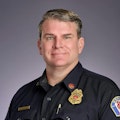Firefighters, Pursuing a College Degree & Sustaining Motivation
Key Takeaways
- Firefighters are accustomed to solving problems in a short time. Those who pursue a college degree must develop a new mindset of enduring motivation and persistence.
- Completing college courses can be individualistic. Firefighter-students who create texting groups via social media apps and messaging apps can create peer support to make up for lack of in-person group support.
- To stay motivated through difficult coursework, be creative and discover ways to incorporate what’s being learned with life and the job.
After more than 10 years as an adjunct faculty professor in Idaho State University’s Fire Administration program, I have been a part of many student journeys pursuing higher education courses and college degrees. As you might gather from the program name, most of these students are current and future firefighters. Increasingly, going to college is becoming a factor in fire service hiring and promotions. Getting a two- or four-year degree involves planning, scheduling, motivation and self-discipline. Developing methods to stay engaged and motivated through the rigors of a multiyear commitment to complete a degree program is paramount to success.
A new mindset
Firefighters are accustomed to solving problems quickly and methodically. Throughout the country, a person can dial 9-1-1 and, within a matter of minutes, have an array of fire apparatus at their location with trained firefighters solving their problem. From a house fire to a brush fire, a vehicle accident or a medical emergency, firefighters will show up, address the situation with professionalism, depart and not ask for anything in return. In a shift schedule routine in which most problems are solved repeatedly in less than an hour, there isn’t a need to maintain a long-term ongoing focus of motivation.
The multiyear, multicourse completion process of obtaining a college degree takes a long-term strategic approach to solving problems that might be new for firefighters. For those individuals who pursue higher education, a new mindset of enduring motivation and a new skillset of persistence often must be developed.
Students who create a long-term timeline and workplan of their coursework are more successful than those who don’t. Firefighters are accustomed to checksheets and checklists as part of their daily shift routine. The same concept of daily checks can be utilized for completion of class assignments. This can be accomplished by creating a checklist of assignments and due dates that are based on the course syllabus.
At the beginning of a class, the syllabus’ assignments and due dates should be reviewed. After this, daily and weekly checklists that are related to timelines of assignment completion deadlines can be created. Daily or weekly reminders to review current course assignments and to check off assignments as they get completed can be set.
To assist in staying on track with the completion of assignments, I have observed many students set alerts on their phone to serve as reminders to complete course assignments. The alert reminders increase motivation to complete course assignments.
For courses that must be completed for degree programs, a separate spreadsheet that outlines all of the courses can be created. This spreadsheet should be reviewed regularly but not necessarily weekly. An admissions counselor or college advisor can assist with degree planning.
Peer support
Generally, fire service training is a group effort of peers and coworkers who develop strong bonds and friendships and who support each other throughout training activities and events. It’s common for entry-level firefighters to start their fire service career with a fire academy of multiple recruits that lasts 14–18 weeks and covers all of the standardized curriculum of the NFPA Firefighter I and Firefighter II standards. An entry-level firefighter also completes some additional training that’s related to EMS, hazmat and wildland fire suppression.
As firefighters continue their career path, other structured courses, such as driver/operator, company officer, safety officer, incident command and wildland urban interface, are taken.
Group congeniality is strong throughout these training events. There isn’t only intrinsic motivation for success but peer pressure motivation when you are part of a group of people completing fire training.
An individualistic approach to completing college courses can be a significant departure from the group effort. The peer support of fire department training isn’t as present in college course completion. To maintain motivation on an individualistic level and to create a sense of peer support, my students create texting groups with other classmates via social media apps and messaging apps that are on their phone. This is particularly helpful in regard to online courses, where in-person collaboration and study groups between classmates doesn’t occur. The regular interaction and support that are shown across these platforms tend to make up for the lack of in-person group motivational support to complete assignments and to stay on track with coursework.
I have seen workout challenges posted among classmates, where upon completion of an assignment, everyone in the group had to complete 50 pushups and 50 situps. Even when they aren’t physically present together, they still motivate each other to get course work accomplished.
Tying coursework with life
Throughout college studies, not every class will be interesting. To stay motivated through the rigors of uninteresting or difficult coursework, it’s worthwhile to be creative in discovering ways to incorporate the learning from life and work—for example, in conjunction with a finance class, opportunities to meet with the people in the agency’s finance department and real-life examples from the agency in coursework.
In conjunction with a personnel management course, teaming with human resource department staff members to provide insight into their daily and weekly activities that surround personnel management activities can be helpful.
Other examples include using events that occurred on fire calls to incorporate into a creative writing assignment; digging into the history of the department for a research project; or teaching a department class as part of a communications class.
If creative, many opportunities exist to apply real-life experience into otherwise uninteresting coursework. Bringing the coursework to life through real-time application might make even the mundane more interesting.
Space and time
Whether higher education is pursued before the start of a fire service career, at a midpoint or as a senior member of a department, obtaining a degree makes a member a more viable candidate for roles and positions both in and out of the fire service. A degree is evidence of a person’s ability to problem-solve and strategize beyond the day-to-day, minute-to-minute demands of firefighting. It demonstrates the ability to think strategically and work steadily toward a long-term goal.
Be cognizant of the shift from instant decision-making to a longer-term lens, prioritizing the things that build stamina, motivation and support.
Furthermore, professors are there to help, and they want to help students to learn and to become the best-educated version of themselves, but sometimes they must be sought out.
College courses don’t teach what to think. They teach how to think critically and how to solve complex problems in life and in the workplace. Give yourself the space and time in college to grow, both as a person and as a firefighter.
About the Author

Charlie Butterfield
Charlie Butterfield is a deputy chief with the Meridian, ID, Fire Department. He has 28 years of fire service experience, is a graduate of the National Fire Academy’s Executive Fire Officer Program and is a designated Chief Fire Officer by the Center for Public Safety Excellence. Butterfield holds a master’s degree in education from Colorado State University. He represents the state of Idaho on the board of the Western Fire Chiefs Association and is an adjunct faculty professor for Idaho State University, where he instructs courses on fire administration.
